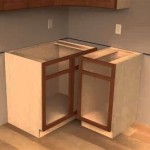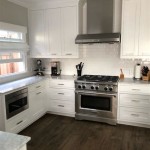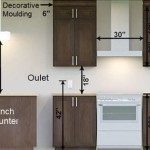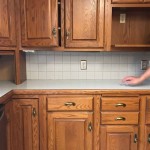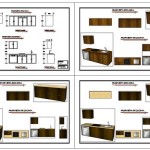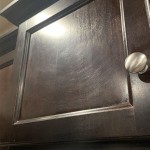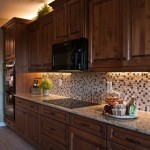Best Paint to Use on Oak Kitchen Cabinets
Updating oak kitchen cabinets with a fresh coat of paint is a popular way to modernize a kitchen without the expense of a full remodel. Choosing the right paint, however, is crucial for a durable and beautiful finish. Several factors influence paint selection, including the specific type of oak, the existing finish, and the desired aesthetic.
Key Considerations When Choosing Paint for Oak Cabinets
Oak, known for its prominent grain, presents unique challenges and opportunities when painting. The following points outline key considerations:
- Grain Filling: Oak's open grain pattern often requires filling to achieve a smooth, modern look. This is particularly important for lighter paint colors.
- Primer Selection: A high-quality primer is essential for proper paint adhesion and to prevent bleed-through from tannins in the wood.
- Durability: Kitchen cabinets experience frequent use and exposure to moisture and grease. A durable, scrubbable paint is necessary to withstand daily wear and tear.
Recommended Paint Types for Oak Cabinets
Several paint types offer excellent results on oak cabinets, each with its own advantages and disadvantages.
1. Hybrid Alkyd Paints
Hybrid alkyd paints combine the durability of oil-based paints with the lower VOC content of water-based paints. They offer excellent adhesion, leveling, and a smooth, hard finish, making them a popular choice for cabinets. They also provide good resistance to moisture and stains.
2. Acrylic Latex Paints
Acrylic latex paints are known for their ease of use, quick drying time, and low odor. They are also available in a wide variety of colors and sheens. While generally less durable than oil-based or hybrid alkyd paints, high-quality acrylic latex paints formulated for cabinets can provide excellent results when combined with the proper primer.
3. Oil-Based Paints
Traditional oil-based paints offer excellent durability and a smooth, luxurious finish. They are highly resistant to moisture and stains, making them well-suited for high-traffic areas like kitchens. However, oil-based paints have a longer drying time, require specific thinners for cleanup, and emit higher VOCs compared to water-based options.
Choosing the Right Sheen
The sheen, or gloss level, of the paint impacts both the aesthetic and the durability of the finish. The following are common sheen options for kitchen cabinets:
1. Satin
Satin sheen offers a good balance of durability and a subtle, soft glow. It is often a preferred choice for kitchen cabinets as it is less likely to show fingerprints and imperfections compared to higher gloss finishes.
2. Semi-Gloss
Semi-gloss provides a higher level of shine and increased durability compared to satin. It is more resistant to moisture and stains, making it suitable for high-traffic areas. However, it also reflects more light and can highlight imperfections in the cabinet surface.
3. High-Gloss
High-gloss offers the highest level of shine and durability. It is highly resistant to moisture, stains, and scratches. However, it is also the most likely to show imperfections and may not be suitable for all kitchen styles.
Priming Oak Cabinets for Painting
Proper priming is crucial for achieving a professional, long-lasting finish on oak cabinets. The following steps should be followed for optimal results:
1. Cleaning
Thoroughly clean the cabinets with a degreaser to remove any grease, grime, or dirt. Rinse with clean water and allow to dry completely.
2. Sanding
Lightly sand the cabinet surfaces with fine-grit sandpaper (150-220 grit) to create a better surface for primer adhesion. Remove any sanding dust with a tack cloth.
3. Applying Primer
Apply a high-quality, stain-blocking primer specifically designed for wood. Follow the manufacturer's instructions for application and drying time.
Professional Painting Tips
While painting cabinets can be a DIY project, achieving a truly professional-looking finish often requires specific techniques and tools.
1. Spraying vs. Brushing/Rolling
Spraying provides a smoother, more even finish, particularly on detailed or intricate cabinet designs. Brushing and rolling are also viable options, but require careful technique to avoid brush strokes and ensure even coverage.
2. Multiple Thin Coats
Applying multiple thin coats of paint is preferable to applying one thick coat. Thin coats dry more evenly and are less likely to drip or sag.
3. Proper Ventilation
Ensure adequate ventilation when painting, especially when using oil-based or hybrid alkyd paints. Open windows and use fans to circulate air and reduce fumes.

Best Paint For Kitchen Cabinets 24 Brands Blind Tested 2024

Best Paint For Kitchen Cabinets 24 Brands Blind Tested 2024

How To Paint Oak Cabinets And Hide The Grain Tutorial
:strip_icc()/101671998-27cdf40f639448d0a56ff6c7eab609d7.jpg?strip=all)
Expert Tips For Painting Oak Cabinets

How To Make Oak Kitchen Cabinets Look Modern Celeste Jackson Interiors

Are You Thinking Of Painting Your Kitchen Cabinets Read This First

How To Paint Fake Wood Kitchen Cabinets Simple Made Pretty 2024

How To Paint Your Cabinets Like The Pros And Get Grain Out Decor

Painted Wood Cabinets Vs Stained A Questionnaire Kylie M Interiors

Painting Oak Cabinets White Best Diy Tutorial 2024
Related Posts

